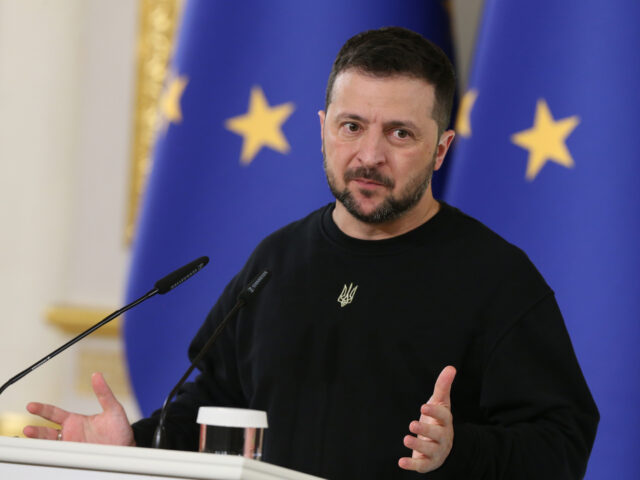Ukrainian President Volodymyr Zelensky has claimed that EU nations have only managed to deliver 30 per cent of their pledged artillery shells, once again underscoring the hapless state of Europe’s military capabilities.
While establishment media, Eurocrats, and Kyiv have all pointed their fingers at the United States and the ongoing dispute over further American funding of Ukraine as a reason for recent battlefield losses to the Russians, President Zelensky revealed that the apparent artillery shortage is in large part due to failures of the EU to meet its commitments.
“Out of the million shells that the European Union promised us, not 50 per cent came, but 30 per cent, unfortunately,” Zelensky told reporters this week according to the EU-funded Euractiv website.
Brussels committed last year to send at least a million shells to Ukraine by March of this year, however, in January, the bloc admitted that it would only be able to meet half that, with around 524,000 shells planned to have been delivered by the end of next month. Yet, so far, only 355,000 ammunition artillery rounds have been sent to Kyiv from EU states. They now claim that they will surpass the million shell mark by the end of the year.
Commenting on the shortfalls, the EU’s top diplomat, Spanish socialist politician Josep Borrell — whose own country has consistently failed to meet NATO spending requirements — urged EU countries to find ways to step up their efforts, saying: “Ukrainian soldiers are determined to fight, but they need ammunition. Urgently and in huge quantities.”
“I feel therefore it is my duty and responsibility to reach out to you once again to see what more we can do in support to Ukraine,” Borrell wrote in a letter to member states, adding: “Doing nothing is not an option.”
With their security being underwritten by the American taxpayer, wealthy European nations have long focussed their budgets on providing generous socialised healthcare packages and other welfare schemes rather than properly funding their military.
Last year, prosperous Western European NATO allied nations including Denmark, France, Germany, Italy, Spain, and the Netherlands, among others, all failed to meet the 2 per cent of GDP spending obligation of the alliance, despite claims of concern about a potential Russian attack on NATO.
Commenting on the imbalance between U.S. and European defence spending, Senator J.D. Vance (R-OH) wrote last week that the money Europe chose to spend elsewhere besides defence should be viewed as “an implied tax on the American people to allow for the security of Europe.”
“Nothing in recent memory demonstrates this more clearly than the war in Ukraine. There is frankly no good reason that aid from the US should be needed. Europe is made up of many great nations with productive economies,” Senator Vance wrote. “They ought to have the capacity to handle the conflict, but over decades they have become far too weak. America has been asked to fill the void at tremendous expense to its own citizens.”
The issue of European NATO delinquency came to the forefront of international politics once again over comments made by Donald Trump, who has long been critical of the Europeans for failing to live up to their obligations, stating in 2018, for example, that it was “unfair” for the United States to protect countries like Germany from a supposed Russian threat while Berlin was busy inking large gas deals with Moscow.
Earlier this month, the former president recounted a story of his time in office in which he warned an unnamed European NATO ally leader that the U.S. would not protect them from Russia if they continued to fail to meet their defence spending requirements, saying: “You didn’t pay? You’re delinquent?… No I would not protect you. In fact, I would encourage them [Russia] to do whatever the hell they want. You gotta pay. You gotta pay your bills.”
Despite NATO General Secretary Jens Stoltenberg previously admitting that Trump’s tough line towards NATO allies had resulted in an extra $100 billion being committed by Europe and Canada towards defence, the international community and media had a meltdown over the comments, once again claiming that he was undermining the Western alliance. However, according to The Times of London, many European leaders acknowledge behind closed doors that the former president “has a point“.

COMMENTS
Please let us know if you're having issues with commenting.